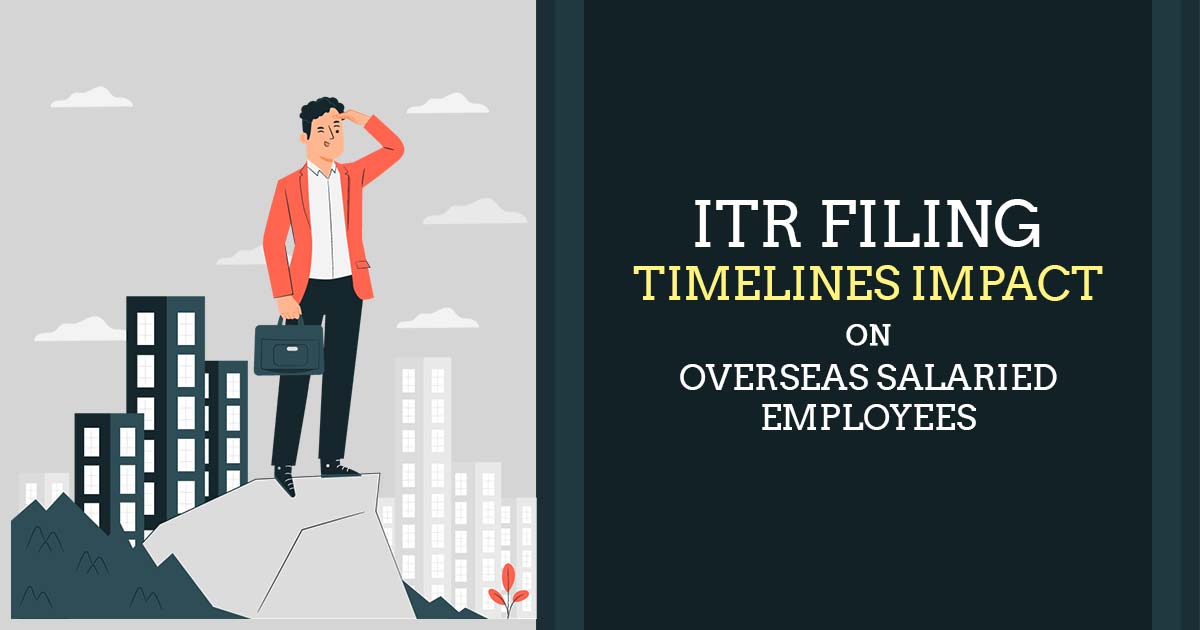
As most of us are aware, India’s tax year runs from April to March. Salaried taxpayers must submit their first return of income by the 31st of July following the relevant tax year, but they also have a further five months to do so in order to comply with the law or revise their initial return.
In other words, individuals have nine months from the conclusion of the applicable tax year to file their personal tax return (original or modified). This seems like a realistic window of time for salaried taxpayers to guarantee compliance. However, if one has been sent to work abroad, it may not be the case (also referred to as mobile employees).
One could be curious as to what the extra requirements are that call for a longer time to complete the tax compliances. Let’s quickly review the legislative context.
Double Taxation (DTAA)
The goal of double tax avoidance agreements (DTAA) is to prevent double taxation on the same income.
There are two approaches to avoiding double taxation: by exempting foreign-earned income from taxes in the country of residence, or by giving credit for taxes previously paid abroad in the country of residence. The DTAA occasionally additionally stipulates reduced tax rates for a specific source of income. Additionally, Indian tax laws offer procedures for requesting such benefits.
The taxpayer must submit Form 67 together with documents substantiating or demonstrating the payment of foreign taxes in order to claim credits for taxes paid abroad (Foreign Tax Credit-FTC). A non-resident would also require a Tax Residency Certificate (TRC) to prove that they are a resident of the foreign country in order to be qualified for the DTAA’s exemption.
After Going Over History, Where May the Difficulty Lie?
It mostly results from the different tax years between India and other nations. While some nations use any other 12-month period as the tax year, many overseas tax authorities use the calendar year. This is made more difficult by the fact that different tax return timeframes may make it difficult to file Indian tax return documents. A few of these are listed below:
| Name of the Country | Taxation Year | Due Dates |
|---|---|---|
| United States | Calendar Year | Possible Extension Until April 15 of Next Year |
| United Kingdom | 6 April to 5 April | 31 January of the next year |
| Germany | Calendar Year | Further Extensions are Available if Prepared by a Professional Tax Advisor by 31 July of the Following Year |
| Australia | 1 July to 30 June | The following 31 October |
| Thailand | Calendar Year | For Paper Filing, the Deadline is 31 March and for Online Filing, it is 8 April Next Year |
| Spain | Calendar Year | 30 June of the Next Year |
| Canada | Calendar Year | On or Before 30 April Next Year, or on the Next Working Day |
The scheduling discrepancies that affect the procedural requirements, as shown in the above table, provide a challenge for foreign-salaried taxpayers. Although Form 67 is not a new procedural necessity, the difficulty increases as the deadlines for Indian tax returns get shorter.
Before AY 2016–17, an amended or belated income tax return could be submitted up to two years after the end of the applicable financial year. After that, it was cut to one year starting with AY 2017–18.
Though the government had already extended the schedule by an additional three months because of the epidemic, the timeline was further cut to nine months beginning with AY 2021–22.
The huge technology improvement in the income tax division, which was announced in the Budget 2021 memorandum, has significantly decreased the amount of time needed to perform and finish the operations.
Unfortunately, because most tax filing deadlines fall after December 31, the shorter deadlines fail to take into account the challenges faced by mobile employees who must gather information or proof about income from abroad, taxes paid on that income, and tax residency status.
For the sake of illustration, assume a person travelled to the US on January 1, 2024, and is now taxable in India for the income they made there between January 1, 2024, and March 31, 2024. (covering the India tax year 2023-24).
Therefore, the person must file an accurate and comprehensive tax return (for India) by December 31, 2024, taking into account income from the US as well.
The individual cannot, however, obtain the US tax return or payment proofs for the income period from January 2024 to March 2024 before the Indian tax filing deadline of December 31, 2024, because the US uses the calendar year as its tax year and allows individuals to file their tax return until October 15, 2025. (that falls even before the completion of the US tax year).
In the current situation, this would entail that a person would either have to abandon their FTC claim or proceed with it based on monthly offshore income and withholding data that would not quite comply with Indian tax regulations.
Consult for the Mobile Workers
Mobile workers are turning to the next Budget for a remedy in the shape of an extended deadline or a streamlined procedure because the procedural need shouldn’t contradict the legislative aim. In the past, suggestions have been made to convert India’s financial year to a calendar year to align it with the financial calendars of almost 150 other nations worldwide. Although it can have a variety of effects, such alignment might potentially be a solution to deal with this anomaly.
Radhika Viswanathan is the executive director, Vinit Turakhia is the senior manager and Jayabalaji is the assistant manager with Deloitte Haskins & Sells LLP.









